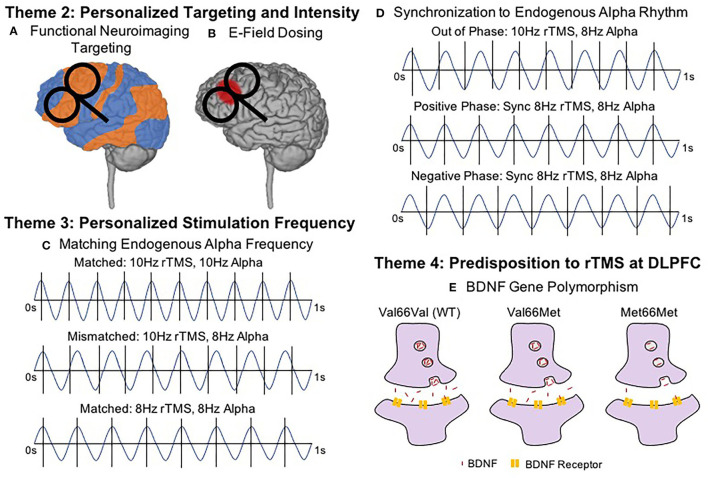Figure 2.
Key Brain States and Predispositions To Consider in Next Generation rTMS Therapies. (A) Functional Neuroimaging Targeting (Resting State Functional Connectivity; rsFC Targeting and concurrent TMS-fMRI). Target selection may become personalized based on functional connectivity and/or symptoms. Combining single pulses of TMS and measuring the blood oxygen level dependent (BOLD) signal may further help to individualize stimulation targets and possibly predict treatment course outcomes. (B) Electric Field (E-Field) Dosing. Intensity selection may utilize realistic head models and MRI-based E-field dosing to more precisely estimate the stimulation delivered to the target, particularly outside of the motor cortex. (C) Matching Endogenous Alpha Frequency. Patients with endogenous alpha rhythms closer to (or at) 10 Hz (top) responded better to 10 Hz rTMS than patients who were mismatched (middle). Most effective rTMS may involve stimulation at the endogenous frequency (bottom). (D) Synchronization to Endogenous Alpha Rhythm. Through closed-loop EEG, synchronized delivery of each rTMS train with an individualized endogenous alpha rhythm and aligning the timing of the TMS pulse with a specific phase of the waveform appears to further optimize rTMS effects. Here we show synchronized rTMS-EEG in three phases. Out of Phase describes when pulses are delivered without regard to endogenous oscillations (e.g., 10 Hz stimulation delivered for someone with endogenous 8 Hz oscillations). When rTMS is delivered In Phase, the pulses can be synchronized with the peak of each oscillation (i.e., Positive Phase) or at the trough of each oscillation (i.e., Negative Phase). Importantly, synchronizing the endogenous alpha rhythm could occur at any frequency, e.g., 8.5 Hz. (E) Predisposition to rTMS—BDNF Gene Polymorphism. Genetic predispositions may influence individual response to rTMS, such as the Val ??Met single nucleotide polymorphism found in the brain derived neurotrophic factor (BDNF) gene which impairs the normal plasticity response to rTMS protocols.

